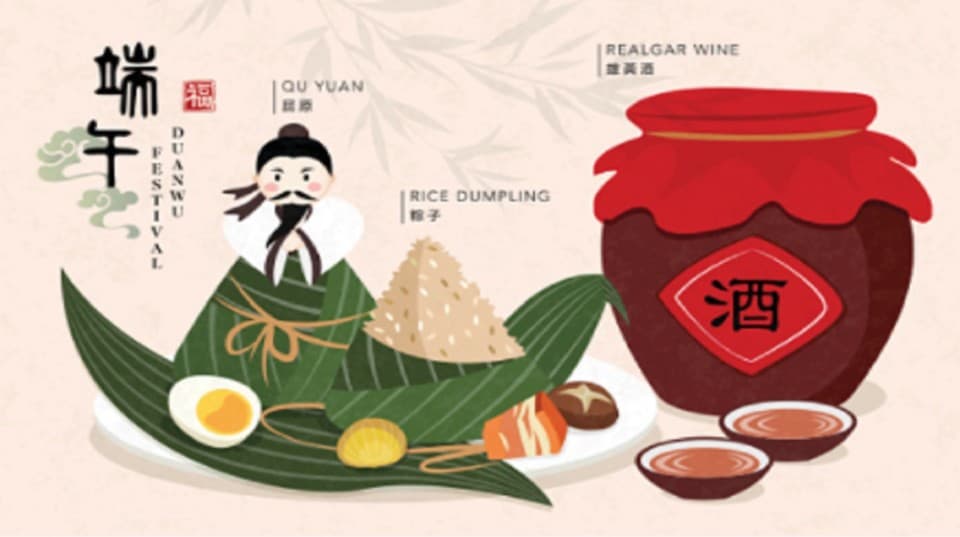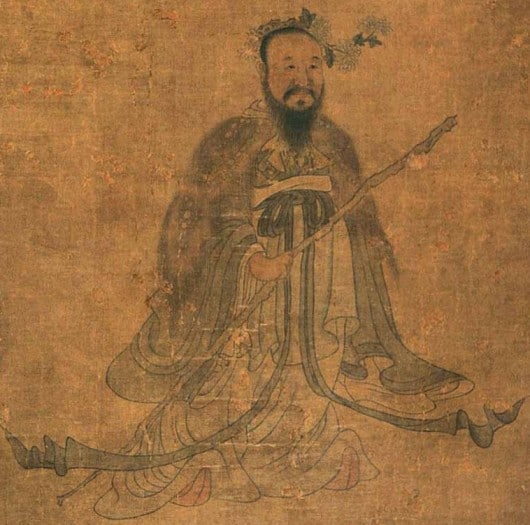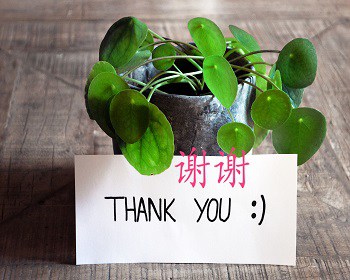Duan Wu Jie (端午节 duān wǔ jié) is also known as dragon boat festival (龙舟节 lóng zhōu jié), dragon day, double fifth festival (重五节 chóng wǔ jié)etc. It is one of the four most important festivals celebrated especially in mainland china namely Spring festival (春节 chūn jié), Qing Ming Festival (tomb sweeping) (清明节 qīng míng jié) and Moon Cake Festival (中秋节 zhōngqiū jié)
Duan Wu Jie occurs on the fifth day of the fifth month on the Chinese lunisolar calendar.
In September 2009, UNESCO added Dragon Boat Festival to the Intangible Cultural Heritage list. This making it the first Chinese festival to receive the honor.

The origin of Duan Wu Jie
There are about 3 different versions regarding the origin of Duan Wu Jie.
First version is the most popular and well known. It is to commemorate the life and death of the famous Chinese scholar Qu Yuan (Chu Yuan). He was a loyal minister of the King of Chu in the third century BCE. Qu Yuan’s wisdom and intellectual ways antagonized other court officials. Thus they accused him of false charges of conspiracy and was exiled by the king. During his exile, Qu Yuan composed many poems to express his anger and sorrow towards his sovereign and people.

At the age of 61, Qu Yuan drowned himself by attaching a heavy stone to his chest into the Miluo River in 278 BCE. The people of Chu tried to save him believing that Qu Yuan was an honorable man; they searched desperately in their boats looking for Qu Yuan but were unable to save him.
Wu Zixu 伍子婿
2nd version – to commemorate Wu Zixu 伍子婿, a general and politician of the Wu kingdom in the Spring and Autumn period (722–481 BC). Wu Zixu was forced to kill himself by King Fucai 夫差 because he would not listen to Wu about conquering the state of Yue. King Fucai instead listened to Bo PI 伯嚭 to execute Wu Zixu for treason. His body was thrown into the qiantang river (钱塘江) on 5th of the fifth month.
曹娥 Cao e
3rd version – to commemorate 曹娥 Cao e, a famous filial daughter in the Eastern Han Dynasty. Her father fell into the Shunjiang River (舜江)during a sacrificial festival of welcoming the Wu god ( Wu referring to 伍子婿). Not seeing the body for 17 days, she jumped into the river to search. On the fifth day, her drowned body surfaced with the father’s body.
Origin of Dragon Boat Race
端节考 duān jié kǎo
1st version is according to a book written by Mr. Wen Yiduo 闻一多 called 端节考 duān jié kǎo,dragon boats existed a few thousand years before the drowning of Qu Yuan. The ancient people of Yue worshipped dragons as totem 图腾 tú téng and considered themselves as descendants. They even had the custom of cutting their hair short and tattooed their bodies [断发纹身duàn fā wén shēn]. And on the fifth day of the fifth month, they would hold a grand totem festival to worship the dragon. Their boats resembled a dragon and had dragon boat races as well as throwing food stuffed in bamboos as worship.
Yuan Ling Millennium Dragon Boat
2nd version is according to the historical origins written in the book called 《沅陵千年龙船》 “yuán líng qiān nián long chuán” literally translated to mean yuan ling millennium dragon boat. This version indicated that Yuanling Dragon Boat originated in ancient times, and the object of worship was Panhu, the common ancestor of all ethnic groups in Wuxi 五溪.
According to the book, Panhu once settled in Banxi Stone Cave, Yuanling 沅陵半溪石穴yuán líng bàn xī shí xué, and had 6 sons and 6 daughters. The sons and daughters married each other and multiplied into 6 ethnic groups of Miao, Yao, Dong, Tu, She and Li 苗、瑶、侗、土、畲、黎 [miáo, yáo, dòng, tǔ, shē, lí ]. After Panhu’s death, the six tribes invited the shaman to a banquet in order to call back his spirit. However, because of the dense forests in Yuanling Mountain, the shaman didn’t know where his soul was. So he asked people of all ethnic groups to build a dragon boat in order to rush through rivers and shouting for his spirit. This later evolved into a boating and soul-raising activity. The Yuanling Dragon Boat originated 5,000 years ago, so it was more than 3,000 years earlier than the commemoration of Qu Yuan.
No matter which version is correct, we get to enjoy the delicious rice dumplings while watching dragon boat races.
What do people in China do during Duan Wu Festival?
Duan Wu festival is one of the important festivals in China. Due to the vast area and different versions of the stories and legends, the Duan Wu festivals not only have many different festival names, but also different customs in different places.
Hang wormwood and calamus
Other than the well known dragon boat races, on this day, it is a must for every household to clean the courtyard and hang wormwood and calamus. The folks believe that wormwood can ward off evil spirits and invite one hundred blessings. During the Dragon Boat Festival, hanging wormwood on the door has become a common custom. Acorus calamus is a medicine that refreshes the body, strengthens bones, and kills insects. As the leaves of calamus are shaped like a sword, it is believed that by placing it at the door will prevent evil. The fortune tellers called it “Water Sword”, but later expounded to become “Pu Sword”, that can slash thousands of evils. Wormwood has the meaning of 招百福 zhāo bǎi fú. Literally means attract hundred blessings. It is a kind of herb that can cure diseases. By hanging it at the door will make the body healthy.
Wash oneself with herbal water
It is believed that the medical properties of all herbs are the strongest during Duan Wu festival. On that day, medical herbs are available everywhere. Bathing with herbal water on Dragon Boat Festival can cure skin diseases and remove evil spirits.
Wearing a perfume pouch
The pouches are usually filled with some aromatic Chinese herbal medicines for their fragrance, for repelling insects, preventing pests, and preventing diseases.
The colorful pouches are made of silk cloth and usually hung around the child’s neck or tied to the front of his or her garment as an ornament.
Tie five-colour silk thread
In the early morning of the Duan Wu festival, the first big thing every adult do is to tie the five-colored thread, red; green;yellow;white and black, on the child’s wrist, ankle, and neck to help the child ward off pests. The colors have to be these five colors according to the five element theory. Green is wood, representing the east; red is fire, representing the south; yellow is soil, representing the center; white is metal, representing the west; black is water, representing the north.
Flying kites
In the cities of southern China, it is also a custom to fly kites during the Dragon Boat Festival. During the Dragon Boat Festival, children flying kites are called “放殃” “let disasters or bad things blew away with the wind”.
Fetch noon water
During the Dragon Boat Festival, “fetching water at noon” is a traditional custom along the Southern Coastal region. Fetching water from a well between 11 and 13:00 on that day is regarded as good luck. The water at this time is the best to ward off evil spirits. The noon water is also called “龙目水lóng mù shuǐ“ literally means dragon’s eye water.
Draw forehead
During the Dragon Boat Festival, it is a customary to use realgar to write the Chinese character “王wáng = king “on children’s’ foreheads. This is said to repel poisonous insects. Furthermore, the Chinese character wang symbolizes a ferocious tiger to suppress evil.
Stick five poisons
Ancient Northerners believed that the Dragon Boat Festival was a poisonous day and an evil day. This belief has passed down from generations. Because of this belief, there are various customs of seeking peace and avoiding the five poisons. Five poisons refer to centipedes, snakes, scorpions, geckos and toads. These five animals were the five major poisons that were popular in the north in ancient times.
They would draw the five poisonous insects with yellow paper, paste them on the wall, and then pierce the drawings of the five poisonous with a pointed needle, which means to get rid of the five poisons.
What are eaten on Duan Wu Festival?
Rice dumplings
Zongzi 粽子, a pyramid-shaped with glutinous rice dumpling wrapped in bamboo leaves, is the specific food on the day. Fillings differ in different parts of China. In north China, people favour the red dates as the filling, and south China, they prefer sweetened bean paste, fresh meat, or egg yolk. In SEA such as Singapore and Malaysia, they even have Nyonya dumplings娘惹粽 which is a blend of traditional Chinese and localised Malay cooking.
Eating the “Five” yellow food in Jiang Nan region
雄黄酒 Xióng huáng jiǔ
People believe that drinking realgar wine can drive away evil spirits, detoxify, and keep good health. In the legend story “ The legend of the White Snake”, White snake revealed her original form after drinking this wine. Thus, people in ancient times believe that realgar wine can cure the poisons from snakes, scorpions and centipedes.
黄鱼 huáng yú
They are the main seafood of the season. These fishes are of high quality and quantity during the month of May.
黄瓜 huáng guā
People called cucumber as “the first fruit” because it is the very first product available in the market about the same timing as the dragon boat festival. Thus, it is a must have during this festive season. Moreover, cucumber detoxifies and clear Summer heat.
黄鳝huáng shàn
It is said that the rice field eel in the month of May and June is tender, delicious and rich in nutrition. There is a saying that during May and June, the nutritional value of rice field eel is higher than ginseng.
咸鸭蛋黄 xián yādàn huáng
Eating salted duck eggs is the custom of Dragon Boat Festival. Eating salted duck egg can get rid of toxics in the body so as to maintain good health.
For video presentation of this post, please click here.
If you find this post interesting, do share with your friends who are interested to know about the Dragon Boat Festival.
Do check out our site for more free lessons.
